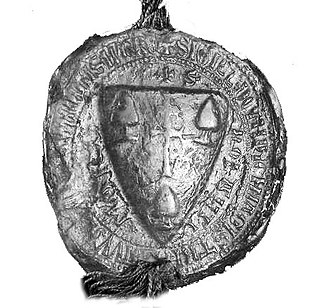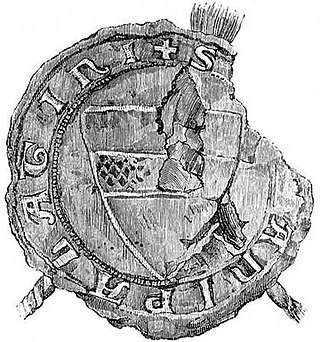Related Research Articles
Kalán from the kindred Bár-Kalán was a prelate and royal official in the Kingdom of Hungary at the turn of the 12th and 13th centuries. He was bishop of Pécs from 1186 until his death in 1218, and ban of Croatia and Dalmatia between 1193 and 1194, thus he was the first prelate in the kingdom to parallelly held a secular office. Kalán's relationship with the monarch was tense in the reign of King Emeric who accused the bishop of incest but could never prove it. Although a part of the canons of Esztergom elected Kalán as archbishop in 1204, his election was not confirmed by the Holy See. Kalán died when planning to go on a crusade to the Holy Land.
Julius (I) from the kindred Kán was a powerful Hungarian baron and landowner, who held several secular positions during the reign of kings Emeric, Ladislaus III and Andrew II. He was the ancestor of the gens Kán which originated from Baranya County.
Denis was an influential lord in the Kingdom of Hungary in the second half of the 12th century. He was Palatine of Hungary in 1184, Ban of Slavonia between 1181 and 1184, Ban of Dalmatia in 1183, and ispán of at least three counties. He was a commander of the Hungarian army fighting against the Byzantine Empire in the reign of Stephen III of Hungary.

Nicholas was a 12th-century prelate in the Kingdom of Hungary. He was Archbishop of Esztergom between 1181 and 1183, and Bishop of Várad from 1163 to 1181.
Denis, son of Ampud, also Denis, son of Apod, was an influential baron in the Kingdom of Hungary in the first decades of the 13th century. He was Master of the treasury between 1216 and 1224. He was also ispán of at least three counties.
Lawrence was a nobleman in the Kingdom of Hungary, who served as Judge royal between 1164 and 1172, during the reign of Stephen III of Hungary.
Charena was a nobleman in the Kingdom of Hungary, who served as Judge royal in 1184, during the reign of Béla III of Hungary.
Mog, also Moch, Magh or Mok was a powerful Hungarian lord in the Kingdom of Hungary at the turn of the 12th and 13th centuries, who served as Palatine of Hungary three times.
Mojs, also Moys or Majos was a Hungarian noble, who served as Palatine of Hungary between 1228 and 1231, during the reign of Andrew II.

Roland (I) from the kindred Rátót was a Hungarian influential lord, who held several important secular positions for decades. He was also the ancestor of the Paksi family.

Arnold (II) from the kindred Hahót was a Hungarian baron, who served as Palatine of Hungary for a short time in 1242.

Denis from the kindred Tomaj was a Hungarian influential baron in the first half of the 13th century, who served as the Palatine of Hungary under King Béla IV from year 1235 to 1241, until his death at the Battle of Mohi.
Maurus (I) from the kindred Győr was a Hungarian noble at the turn of the 12th and 13th centuries, who served as the first known banus maritimus, a predecessor office to the dignity of Ban of Croatia in the Kingdom of Hungary.

Makján (II) from the kindred Aba was a Hungarian nobleman who served as Palatine of Hungary from 1286 to 1287. He was a staunch supporter of Ladislaus IV of Hungary.
Maurice (I) from the kindred Pok was a Hungarian noble in the first half of the 13th century, who had ascended to the upper elite from a lower social status as the faithful confidant of Andrew II of Hungary. He was the forefather of the prestigious Meggyesi family.
Nicholas from the kindred Szák was a powerful Hungarian baron in the first decades of the 13th century. As a confidant of King Andrew II, he served as Palatine of Hungary from 1219 to 1222 and for a brief period in 1226. During his first term, he initiated a comprehensive reform of the judicial system.
Fonsol was a Hungarian lord in the first half of the 12th century, who served as Palatine of Hungary from around 1131 to 1138, during the reign of Béla II of Hungary.
Julius was a Hungarian lord in the second half of the 11th century, who served as Palatine of Hungary at least from 1075 to 1090, during the reigns of Géza I then Ladislaus I.
Albert from the kindred Bogátradvány was a Hungarian noble in the first half of the 13th century, who served as vice-palatine from 1236 to 1239.
Gotthard from the kindred Szolnok was a Hungarian noble in the middle of the 13th century, who served as vice-palatine in the court of rex iunior Stephen in 1264.
References
- ↑ Karácsonyi 1901, p. 3.
- ↑ Zsoldos 2011, p. 141.
- ↑ Engel: Genealógia (Genus Gatal, Szász [Endrédi] de Tamasóc branch)
- 1 2 Karácsonyi 1901, p. 4.
- 1 2 Markó 2006, p. 228.
- 1 2 Zsoldos 2011, p. 16.
- ↑ Makk 1989, p. 116.
- ↑ Szőcs 2014, p. 45.